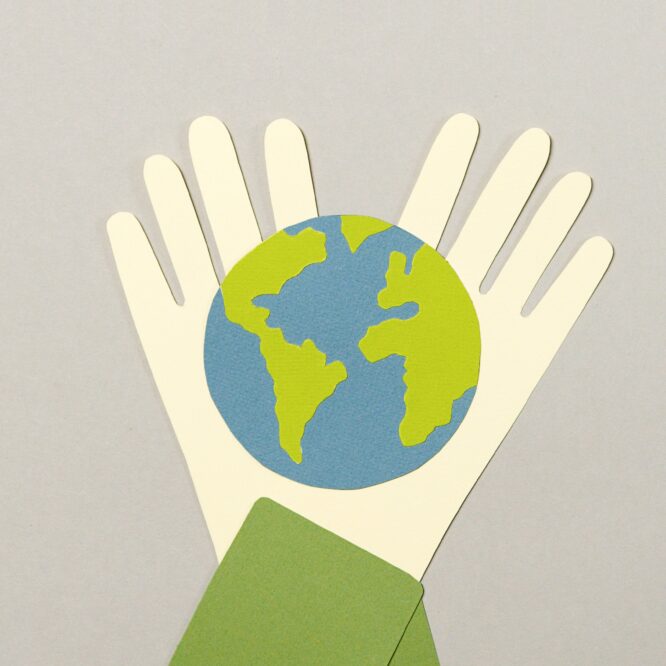My first appointment on my first day as CABI’s rabbi arrived promptly and well-prepared; I soon discovered this was Leslie Drake’s standard operating procedure. Our new office furniture was still in boxes, so we sat around a half-sized classroom table, where Leslie briefed me on the pressing Idaho issue of the day: Proposition 1, a vicious anti-gay ballot initiative. She explained that the local LGBT community and their straight allies had organized to oppose this measure leading up to the November election and emphasized the important role played by progressive faith communities. Leslie looked me in the eye and said: “Rabbi, I have just one question: Are you ready to be an activist? We need your voice.”In that moment, I thought of my rabbinic hero, Abraham Joshua Heschel, who was both a deeply pious Jew and an ardent advocate for justice. In June of 1963, he sent President Kennedy a telegram urging action on civil rights:
Please demand personal involvement, not just solemn declaration. . . Ask religious leaders to call for national repentance and personal sacrifice. . . I propose that you declare a state of moral emergency. The hour calls for high moral grandeur and spiritual audacity.
Leslie and I were hardly Kennedy and Heschel, yet in her request, I heard an echo of that sacred calling. She taught me that in our own way, Congregation Ahavath Beth Israel, too, aspired to moral grandeur and spiritual audacity. Three decades later, I believe we still do.
**********
Last night, I spoke about awe and the wild world. The immensity of God’s creation certainly invites humility and reverence. But nature isn’t the only place where we experience these virtues. In his new book Awe, Dacher Keltner describes eight different paths toward everyday wonder and notes that by far the most common is other people’s courage, kindness, strength, or overcoming. Above all else, we stand in awe of moral beauty, the vision of a more just society.
That’s what we seek here among our CABI community. Our biblical prophets remind us that the true measure of a culture is how its citizens treat one another, especially the most vulnerable. The heart of our congregation’s mission is right relationships.
How do we pursue that goal? In fiscal matters, we recognize that the way we collect and spend money is every bit as important as how much we raise. We strive to address our financial needs equitably, and approach employment as a partnership grounded in fair wages and generous working conditions. When choosing leaders, we honor Jewish engagement over wealth or status, and aspire to maintain a governing board that looks like our dynamic congregation: young and old; queer and straight, Jews by birth and Jews by choice, pious and secular, from across the growing ethnic and ideological spectrum of the progressive Jewish community. We recognize the ongoing need to improve our physical facility, to provide better access for people with disabilities, and gender-neutral bathrooms that affirm the life experiences of our transgender and non-binary congregants. In this time of climate crisis, we take seriously the moral imperative to lessen our carbon footprint and make our operation more sustainable, to creatively reconsider our energy sources, as well as the food and materials we consume. And above all, our sacred calling obligates us to listen to and learn from one another, including those with whom we profoundly disagree. We Jews have a precious legacy of holy debate, dating back to Abraham arguing with God. In our painfully polarized world, we can lead by example, showing that differences of opinion can generate respect rather than enmity. Being far from perfect, we have a long way to go in all these endeavors, but I believe that we stand united in our commitment to CABI as a kehillah kedoshah, a holy, just, and inclusive community.
***********
Long ago, our Rabbis recognized that there is wonder in this vision. In the Talmud, they offer a prayer for anyone who sees a multitude of Jews gathered in one place: Baruch Atah Adonai, Eloheynu Melech ha-olam, chacham ha-razim—Praised are You, Holy One, who knows the secret hearts of all these whose minds and faces are so unlike one another.
This blessing celebrates our diverse origins, experiences, and opinions as a miraculous strength. To stand together, in support of one another, despite our vast differences, knowing that we are all created b’tzelem Elohim, in the Divine Image—that is a truly awesome gift and responsibility.
************
For some rabbis and congregations, our collective pursuit of justice ends here—within our own Jewish communities. A few years ago, Rabbi David Wolpe offered a strong critique of wider social justice agendas in his editorial “Why I Keep Politics Off the Pulpit” he wrote: “Can we not come to shul for something different [than politics]? I want to know what my rabbi thinks of Jacob and Rachel, not Pence and Pelosi.”
Rabbi Wolpe is a gifted colleague and an accomplished scholar. I acknowledge the dangers that he warns against and recognize that some of you share his views. You’re in good company. I know from experience that taking a stand on contemporary social issues can be messy. But you won’t be surprised to hear, in this, my final Rosh Hashanah sermon as CABI’s rabbi, that I respectfully disagree.
I believe our mission extends far beyond tending our own flock; as Isaiah reminds us, the Holy One asks the Jewish people to bear witness in the struggle for justice, compassion, and peace for all Creation. Caring for the Other is an essential part of our Jewish DNA.
In her editorial response to Rabbi Wolpe, titled “What You Call Politics, We Call Torah,” Rabbi Sharon Brous writes:
Our sacred scroll recounts the story of a band of slaves rising up before the most powerful and iconic ruler of the ancient world and demanding freedom and dignity. Is that not a political message? We read these sacred narratives to discern what it means to be Moses, Aaron and Miriam in a world of Pharaohs. How to hold grief and anguish, like Hannah; how to fight back against injustice like Abraham, even when you are but dust and ashes. Religion means nothing if not a response to the greatest moral crises and challenges of our day. Demanding that politics be kept out of shul is like demanding that Torah be kept out of shul.
**********
When we steer away from the pressing issues of our age, we render ourselves at best irrelevant and at worst, complicitous. Dr. King made that very clear in his Letter from Birmingham Jail, a searing response to white Southern clergy who considered political advocacy at odds with faithful community. Writing from his prison cell in 1963, King rebuked moderate rabbis, priests, and ministers for being “more cautious than courageous.” He lamented:
I have watched white churchmen stand on the sideline and mouth pious irrelevancies and sanctimonious trivialities. In the midst of a mighty struggle to rid our nation of racial and economic injustice, I have heard many ministers say, those are social issues with which the gospel has no real concern. . . .
Injustice anywhere is a threat to justice everywhere.
**********
In July of 1994, Leslie Drake did not warn me to stay out of the fray. Instead, like Rabbi Heschel, she recognized, with great moral clarity, that in tumultuous times, neutrality aids and abets evil. To this day, I am profoundly grateful that Leslie invited me—and by extension, the entire CABI community—to muster our courage and pursue justice, with all our heart and soul and might. I’m proud that we accepted her offer and helped defeat Proposition 1. Three decades later, I am even more convinced of the imperative for full engagement. Today, more than ever, we need moral grandeur and spiritual audacity—and I am confident that Congregation Ahavath Beth Israel is up to the task.
My friends, the hour is urgent. Here in Idaho, representative democracy is in existential danger. When I arrived thirty years ago, there was a bipartisan consensus condemning right-wing extremists like the Aryan Nations. Liberals and conservatives alike publicly proclaimed Idaho too great for hate, foremost among them, Republican Governor Phil Batt, an ardent champion of human rights. Today, the GOP party chair openly woos radical reactionaries, whose agenda often animates our state legislature. Bigots run amuck beneath the capitol dome, trampling the rights of gay and transgender Idahoans, immigrants, ethnic and religious minorities, and women. And make no mistake, when elected officials who know better cowardly cave to these bullies, they bear responsibility for the consequences. Idaho is concurrently attracting white supremacists in search of an ethno-state and losing teachers, librarians, and young, creative people of color and queer folks who are tired of living in fear. We’re also bleeding doctors and health care providers, thanks to the most oppressive anti-abortion statute in the nation.
This affront to human decency poses a peril to our Jewish community. White Christian nationalism threatens our security and mocks our highest ideals. It is time to stand up for ourselves and our allies, to protest and vote and mobilize others to do the same. Our social action committee is leading the way, developing initiatives on reproductive rights and climate justice, combatting hunger and food insecurity, and turning back the rising tide of antisemitism. That necessarily also entails fighting racism, nativism, and homophobia, because bigotry directed at any vulnerable group invariably injures us all. As Dr. King recognized, we are “tied in a single garment of destiny.” I encourage you to join our efforts—if not now, when?
**********
I recognize this is no small request. I am effectively urging us to commit to a course that will extend well past my own retirement next July, even as it began long before I appeared on the scene. I know, too, that choosing to be upstanders comes with risk. Public engagement can alienate people who disagree with our stance, both within our congregation and beyond its borders, including friends and family. It also raises legitimate security concerns in a time of heightening threats against the Jewish people. In a region rife with ubiquitous, unregulated firearms, the sense of danger is real. We must we be vigilant about our safety, working closely with allies and authorities to keep ourselves and our neighbors out of harm’s way.
But inaction is even more perilous. Hiding will not keep us safe. Let us heed the hard-won wisdom that Nazi German refugee Hannah Arendt shared in her brief 1942 essay, “Jewish Politics”:
Disdain for democracy and the worship of dictatorial forms of organization are especially fatal for small, oppressed peoples. . . In the midst of the monstrous turmoil the world now finds itself in, those who are unwilling to take any risks are certain to lose everything.
This is not the time to delay, to parse the fine print. Let us, instead, learn from our ancestors at Sinai, who chose bold action over paralysis, answering the Divine Call in one collective voice: “Na’aseh v’nishmah—we will do, and in the doing, come to understand.”
**********
Remember, yirah—awe—always contains a measure of vulnerability. Last night, in speaking about awe and nature, I quoted Henry David Thoreau: “In wildness is the preservation of the world.” It is no coincidence that Thoreau also wrote the groundbreaking essay “On the Duty of Civil Disobedience,”—for he experienced awe in both his cabin at Walden Pond and the nearby Concord jail, where he was imprisoned for refusing to pay taxes to a government that allowed for slavery. So, too, Rabbi Heschel, whose writings marvel at the magnificence of the natural world, marched arm in arm with Dr. King in Selma—and when asked about the experience, replied, “I felt my feet were praying.” Justice, like nature, conjures reverence, resolution, and awe.
**********
I conclude with two challenges we face in healing our broken world. First, I urge us to delve deeper into the Jewish roots of our social justice work. Critics have argued that tikkun olam is not really a Jewish idea at all, just liberal politics masquerading as Jewish values. This charge is historically inaccurate, for the concept of tikkun olam dates back to the beginnings of Rabbinic Judaism. But like many mostly misplaced criticisms, this one contains a grain of truth, for we have too often grounded our positions in secular politics rather than serious Jewish sources. We rabbis need to do a better job teaching the sacred wisdom—both ancient and contemporary—that forms the foundation of our moral commitments. We speak and act with greater power when we draw from those wellsprings, when we better understand where and why Judaism commands us to feed the hungry, treat everyone with dignity, and prioritize the life and health of a mother over that of a fetus. When our pursuit of justice grows from the rich soil of Jewish learning, it is more likely to endure.
To which I hasten to add: this isn’t just—or even primarily—the work of the rabbi. As I look back in the spirit of this season of reflection, my greatest regret as an activist is having placed myself front and center as CABI’s social justice spokesperson for too long, when I could have been doing more to develop a wider cadre of advocates to speak and act on behalf of our congregation. At our best, we rabbis are not meant to be prophetic voices crying in the wilderness; our higher calling is to rally our communities to act collectively. Thankfully, as I now step back in this, the autumn of my rabbinic career, a new, multigenerational leadership team is not waiting for my successor but guiding us forward with passion and grace. We are in good hands.
**********
Our second challenge harkens back to the vision that I shared earlier, of CABI as kehillah kedoshah, a holy and inclusive community. I acknowledge this aspiration can be at odds with the kind of engagement that I am espousing. It’s a fine balancing act, to pursue an unequivocally progressive mission and fully embrace those within the community who take issue with all or part of it. That isn’t easy—but it is essential work that demands trust, transparency, and unwavering attention.
I have often described this vision as stand up and reach out. Not surprisingly, I’ve met with skeptics on both sides who said it couldn’t be done. Some activists question why reach out to those whose politics fall outside the liberal Jewish mainstream? A few conservatives have shared their understandable discomfort being part of a congregation with a social justice agenda they often oppose. But I maintain that our equal commitment to both parts of this covenant—standing up and reaching out—defines our CABI community. For this is, in my eyes, the Jewish way: after passionate debate, we learn and pray and break bread together. We care for one another when we are sick, grieve our losses, celebrate our simchas, and share both daily strengths and stumbling blocks across political boundaries. In these divided times, that is no small miracle.
**********
My friends, Rosh Hashanah is also known as Yom Ha-Din, the Day of Decision. Today we begin a new year, and with it a season of transition for us all. We will wrestle with significant changes in the wider world, in our congregation, and in each of our own hearts and souls. But I am confident that our journeys, like those of our forebears, Abraham and Sarah, will be sources of enduring blessing. Let us be bold, in standing up and reaching out, with love and courage, in the same generous spirit that has animated us over the last three decades. As we travel, separately and together, toward the Promised Land, may the awe that inspires moral grandeur and spiritual audacity be our guiding star. And when my successors show up, first the interim and then the new settled rabbi, I pray that each and every one of you may take your turn as the next generation’s Leslie Drakes, sounding the call and leading the way.







